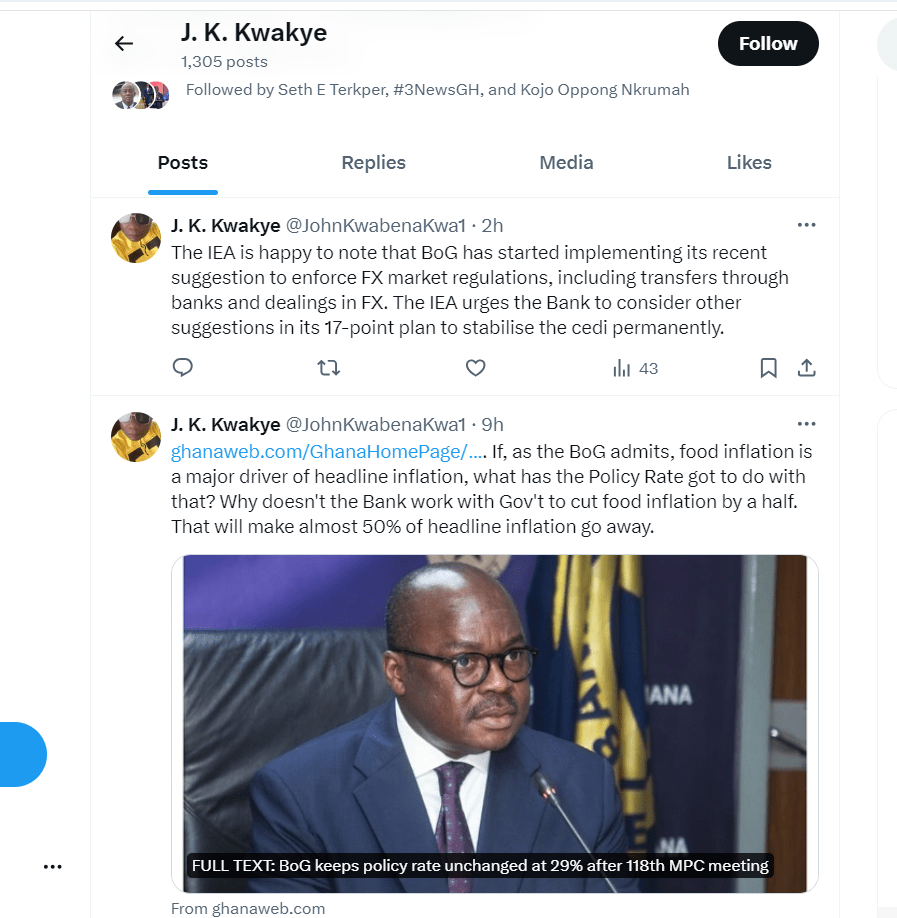The Institute of Economic Affairs (IEA) has commended the Bank of Ghana (BoG) for implementing some of its suggestions to enforce FX market regulations.
The policy and economic think tank also urged the central bank to take further steps to address the fall of the Cedi.
“The IEA is happy to note that BoG has started implementing its recent suggestion to enforce FX market regulations, including transfers through banks and dealings in FX. The IEA urges the Bank to consider other suggestions in its 17-point plan to stabilise the cedi permanently,” the Director of Research at the IEA, Dr John Kwakye wrote on his X platform.
This comes on the heels of measures announced by the central bank to provide stability in the exchange rate for the Cedi.
The Bank, according to Governor Addison, has enough foreign exchange reserves to support the market and economic agents should stop engaging in speculative purchases as they will suffer economic losses when the correction occurs.
Addressing the 118th Monetary Policy Committee press conference on Monday May 27, the Bank of Ghana said it is taking measures to improve market conduct and instill sanity in the market for foreign exchange.

To this end, the Bank has worked with the Ghana Association of Banks to streamline documentation requirements for foreign payments to minimise the incentives to resort to the informal markets.
To deal with the high demand pressures on the foreign exchange market, the Bank has taken steps in the past few weeks to directly absorb foreign exchange needs of some corporate institutions, and this has led to a reduced pipeline demand for foreign exchange from the commercial banks.
The Bank said it is fully aware of the operations of illegal operators in the foreign exchange market and is working with the Financial Intelligence Centre to sanitise the foreign exchange market. Foreign exchange bureaux monitoring will be stepped up to ensure compliance with their regulatory framework.
In line with this, all foreign exchange bureaus advertising rates outside their premises and on social media platforms must immediately desist from the practice. The Bank has set up a task force to monitor all the foreign exchange bureaux to ensure compliance. The foreign exchange market is also affected by sentiments and pronouncements made in this election year and we urge all to manage pronouncements which weakens confidence in the local economy.
On fiscal policy, expenditures outpaced revenue growth in the first quarter, reflecting the
frontloading of IPP arrears payments.
Maintaining strict fiscal discipline for the rest of the year will be crucial to strengthen confidence in the economy. On general macroeconomic conditions, the committee was of the view that while implementation of policies—at the macro and structural reform level — are consistent and align well with the tenets of the IMF-supported programme, there is the need to ensure that the recent depreciation of the currency does not become embedded into the pricing behaviour of businesses and on inflation expectations.
The strong reserve build-up of about US$2 billion since the beginning of the IMF programme, the strong disinflation process, significant progress on fiscal policy consolidation, positive current account balances, and the good progress on the external debt restructuring process, have all worked together in concert to deliver enough buffers to support the exchange rate.
The latest forecast shows a slightly elevated inflation profile on account of recent exchange rate pressures and adjustments in transportation fares. However, the projections show that inflation will remain within the monetary policy consultation clause of 13-17 percent at the end of the year. These forecasts are contingent on sustaining the tight monetary policy stance, including aggressive liquidity management operations.
“Given these considerations, the Committee decided to maintain the Monetary Policy Rate at 29 percent,” he said.


